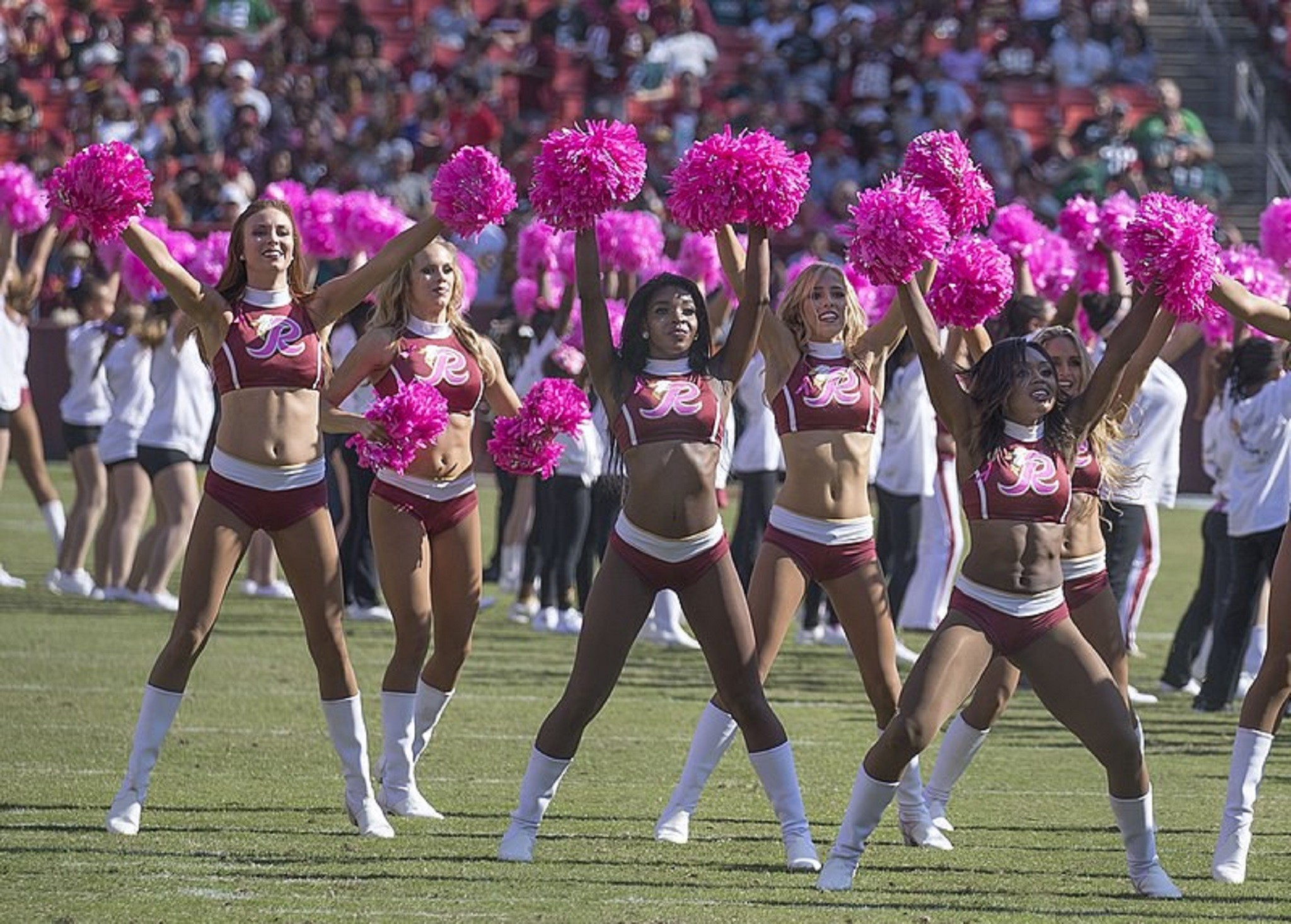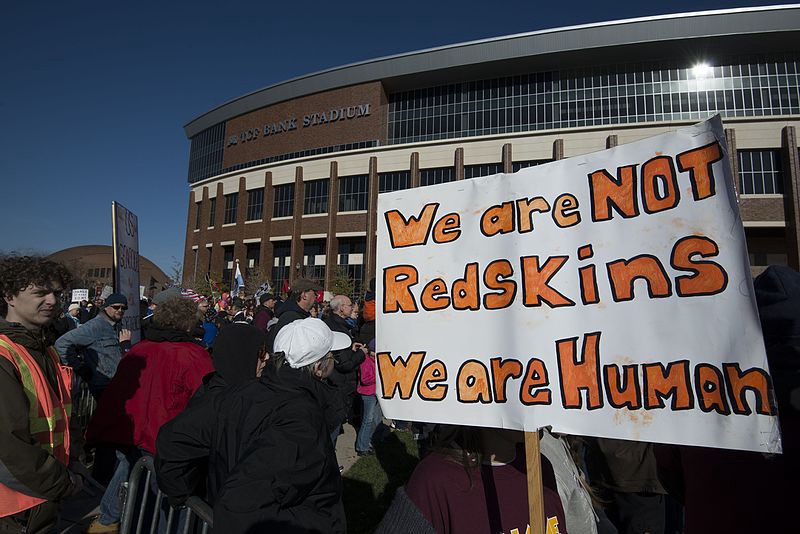America’s other favorite pastime is clunking along somewhat painfully in the modern age.

The Washington Redskins cheerleaders perform before a game against the Philadelphia Eagles at FedExField in Landover, Maryland on October 16, 2016. (photo: Keith Allison)
Problematic
Being labeled “problematic” is the kiss of death in 2019. Which is bad news for professional football in America.
The NFL isn’t aging well in a culture aspiring to be more politically correct.
The average voting liberal democrat is starting to squirm uncomfortably when admitting they like to watch football, and they aren’t the only ones.
That’s not a good sign.
The NFL’s laundry list of social sins is long, and getting longer all the time:
Terrible impact on player health long-term; Native mascotry; openly-sexist culture; huge environmental impact; recent crack-down on peaceful protests about police brutality in America.
Even President Donald Trump weighed in this year, saying today that he would have a hard time letting his son play football.
After numerous reports linking playing football to permanent brain damage became impossible to ignore, it is easy to understand why parents around the country are gently, but firmly, encouraging their children towards other sports.
“If he wanted to? Yes. Would I steer him that way? No, I wouldn’t.”
“I just don’t like the reports that I see coming out having to do with football — I mean, it’s a dangerous sport and I think it’s — I — it’s — really tough, I thought the equipment would get better, and it has. The helmets have gotten far better but it hasn’t solved the problem.”
“So, you know I — I hate to say it because I love to watch football. I think the NFL is a great product, but I really think that as far as my son — well, I’ve heard NFL players saying they wouldn’t let their sons play football. So it’s not totally unique, but I — I would have a hard time with it.” — President Donald Trump, CBS
Player Health
“The reality is, this game destroys people’s brains.” — Bob Costas, 2017
Professional football players, and some positions more than others, it should come as no surprise, often suffer brain injuries in the form of concussions and worse. Bob Costas on the future of football: ‘This game destroys people’s brains”
February 2019: I’m the Wife of a Former N.F.L. Player. Football Destroyed His Mind, NYT.
Playing professional football damages much more than a player’s mind. Long-term damage on a former football player’s body can range from the chronically painful to the outright debilitating.
The NFL isn’t well regarded for lavish treatment of average players retired to injury either. The NFL’s Very Profitable Existential Crisis: The sport is a total mess, and the league has never made more money.

Native Mascotry
Must We Burn The Chiefs? The future of Native mascotry in sports.
“How have we not progressed past these mascots?” asked ESPN’s Howard Bryant in 2017.
How indeed. How can so openly a symbol of racism and discrimination exist without challenge in a culture reckoning with 100’s of years of systemic oppression and its aftermath?
The answer may be, “not long.”
Movements to rename teams are already taking place and building steam around the country as more and more high school and small town teams drop Native mascotry.
The answer is also, too long, as we saw during the Covington Catholic MAGA kids video. Yes, the “Tomahawk Chop” is culturally insensitive, but Native mascotry is to blame. The Covington Teens’ Racist ‘Tomahawk Chop’ Is The Product Of Native Mascotry
Openly-Sexist Culture
Can cheerleading exist in a world where even Playboy magazine doesn’t feel it is appropriate to exploit women’s bodies anymore?
NFL cheerleading is demeaning to women. It’s time to end this nonsense: “The NFL treats its cheerleaders like titillating eye candy. There’s no place for this insulting nonsense in the #MeToo era. Reform it or end it.” USA TODAY
From within and without, there have been accusations of sexism, harassment and worse within an organization that heretofore has been able to keep everyone quiet about it.
Not anymore. This is the Information Age, and there hasn’t been a leak so much as a flood of former and current cheerleaders eager to be heard at last after enduring decades of discrimination and humiliation.
These Ridiculously Sexist Rules From a Cheerleading Handbook Reveal the Profession’s Dark Side.
Domestic violence is also a persistent problem in the NFL: Domestic Violence Expert Resigns From NFL Players Association Commission
Environmental Impact
The NFL has had a department dedicated to finding ways to clean up the environmental impact large events like the Super Bowl have on the cities that host them for years.
2019 will be the first year that a major sponsor, a beer maker, and an environmental group partner have offered to help offset the carbon footprint of so many fans traveling to the game. Super Bowl organizers, partners expand bid to run clean energy show.
Great pains were also taken when building the Atlanta stadium where today’s Super Bowl will be held to ease the ecological footprint of such a massive project.
“With buildings of this size, it’s imperative that they are designed and operate sustainably to minimize the impact on the environment. Water was particularly important, given that the stadium sits at the top of Proctor Creek Watershed, which is known for flooding during large storms.”
“The building is designed to recapture and reuse rainwater with a 600,000-gallon cistern. In addition, there’s a really unique partnership with Trees Atlanta that will allow this rainwater to be used to irrigate the trees. Fans will also notice more than 4,000 solar PV panels on the stadium site.” — Bill Johnson, design principal for HOK Architects, the firm responsible for designing the stadium.
Can the NFL Be Saved?
Reform or Be Reformed
The NFL needs to follow the sterling example of the movie industry and regulate itself before someone else does.
The movie industry scented a government censorship crack-down or public out-cry and subsequent legislative action of some kind was imminent when an act largely focused on radio censorship was ruled applicable to the new industry of film.
Before the legislative body could respond with federal regulations and oversight, the MPAA was formed by the movie industry and movie production companies moved to regulate themselves in an effort to avoid government censorship.
The rating system doesn't satisfy everyone; it wasn’t meant to.
Movie production teams and legal teams are notorious for cutting just enough from an R-rated movie to get a more lucrative plum PG13 rating. Pushing the limits of the rating system might incense some political action groups who periodically call for the movie ratings systems to be taken out of the hands of the movie production and distribution companies.
The watchdog groups argue that these companies have a financial conflict of interest when it comes to including as much violence, sex and profanity as possible for maximum profit. U.S. watchdog group calls for new TV, movie rating system.
When one of these attempts gets enough support, wise movie moguls send their best to Washington to pledge change and reform. And they do it. But only just.
The movie rating system that wasn’t meant to satisfy every concerned parent and anti-violence advocate was really only meant to placate lawmakers just enough to let the movie industry continue business as usual.
It works, too. The movie industry remains self-regulated to this day.
If the NFL is a savvy organization, and American professional football a wise industry, it will read the writing on the wall and move to regulate itself before the government does. Or even before the public asks it to.
Self-regulation has allowed the movie industry to do whatever it wants, if slowly.
The media watch-dog groups who periodically challenge the movie industry’s right to self-regulate are absolutely right and everyone knows it.
Movies today show more violence, more nudity and more controversial material than ever before. Watch the first Rambo and the last one and see for yourself.
The camera used to pan away. A violent act was suggested perhaps, strongly. Movie wizards used sound. Suggestions. A brief flashback. In 2019, extended, hyper-realistic scenes of horrific violence are almost unwatchable and “Torture Porn” has become an entire sub-genre of horror movies that feature unmitigated gore.
How does the movie industry get away with it?
By being smart. By regulating themselves and rating those movies so that children, and those lacking the intestinal fortitude for such violence, will know to avoid them. In theory anyway.
Football is a Game of Inches
Is football dying by inches?
Football viewership ratings have been falling steadily over the last few years, and experts are sounding the alarm about a sport that’s popularity may wane suddenly in the wake of a cultural shift toward more socially acceptable attitudes.
“The NFL probably peaked two-years ago. It’s basically treading water.” — Andrew Zimbalist, economist at Smith College
The NFL argues, rightly, that while ratings may be down, profits are up. And ratings may have occasional dips yet go up in an average over time. Both true.
Yet, industry insiders are not optimistic that football, in its current form, can survive. The most fundamental question is, “Can football be played without injuries?”
“I think the NFL is 10 years away from an implosion,” — Mark Cuban, owner of the NBA’s Dallas Mavericks
Only time will tell.
(contributing writer, Brooke Bell)